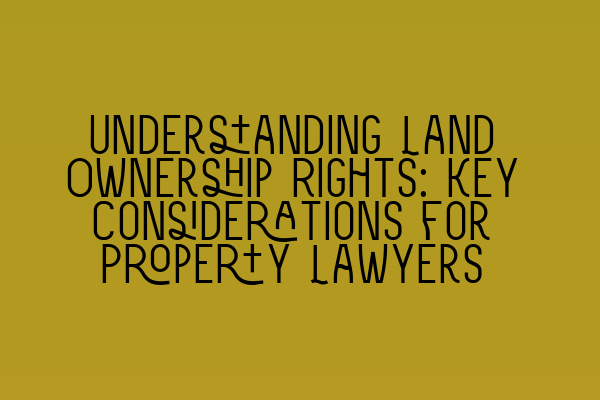Understanding Land Ownership Rights: Key Considerations for Property Lawyers
As a property lawyer, it is crucial to have a comprehensive understanding of land ownership rights. Land is one of the most valuable assets, and any legal dispute or transaction related to land can have significant implications. In this blog post, we will explore the key considerations that property lawyers need to keep in mind when dealing with land ownership rights.
1. Freehold vs. Leasehold: Understanding the Basics
The first and foremost consideration is to differentiate between freehold and leasehold properties. Freehold ownership grants the owner absolute rights over the land, while leasehold ownership involves a lease agreement with the freeholder. It is essential to grasp the legal differences between these two forms of ownership and the associated rights and responsibilities.
2. Title Deeds and Land Registry Information
Title deeds and land registry information play a vital role in understanding land ownership rights. Property lawyers should carefully examine the title deeds to verify the legal owner, any restrictions, and easements affecting the land. The Land Registry is an invaluable resource for obtaining accurate and up-to-date information about land ownership, boundaries, and any registered interests.
3. Covenants and Easements
Covenants and easements are legal obligations or rights that may affect land ownership. Covenants are legally binding agreements between property owners and may restrict the use or development of the land. Easements, on the other hand, grant specific rights to individuals or organizations over the land, such as access rights or drainage rights. Property lawyers must identify and analyze any covenants or easements impacting the land.
4. Adverse Possession
Adverse possession refers to the legal principle that allows someone to become the registered owner of land by occupying it without the owner’s permission for a specified period. Property lawyers need to carefully assess any potential adverse possession claims, which may have significant implications on land ownership rights. Understanding the relevant legislation and case law is crucial in addressing such claims effectively.
5. Boundaries and Party Wall Agreements
Disputes over boundaries and party wall agreements are common in property transactions. Property lawyers must advise their clients on boundary disputes and review any relevant agreements carefully. The accurate identification and understanding of boundaries are crucial in determining land ownership rights and avoiding unnecessary legal disputes.
6. Restrictive Covenants and Planning Permission
When dealing with land ownership rights, it is vital to consider any restrictive covenants and planning permission requirements. Restrictive covenants may restrict certain activities on the land, such as building extensions or changing the land’s use. Planning permission requirements must be thoroughly analyzed to ensure compliance and avoid potential legal issues.
7. Professional Indemnity Insurance
Property lawyers must have adequate professional indemnity insurance to protect themselves and their clients against any potential errors or omissions. This insurance is essential to cover any claims arising from negligence or professional misconduct. Ensuring appropriate coverage gives both the lawyer and the client peace of mind and safeguards their interests.
Conclusion
Understanding land ownership rights is indispensable for property lawyers. By considering the key aspects mentioned above, property lawyers can effectively advise their clients on land-related issues, navigate complex transactions, and minimize legal risks. An in-depth knowledge of freehold and leasehold ownership, title deeds, covenants, easements, adverse possession, boundaries, planning permission, and professional indemnity insurance is crucial for providing quality legal services in the field of property law.
For further preparation and practice, SQE 1 Practice Exam Questions and SQE 1 Practice Mocks FLK1 FLK2 are excellent resources to test your knowledge in property law. Additionally, SQE 1 Preparation Courses and SQE 2 Preparation Courses will equip you with the necessary skills to excel in the SRA SQE exams. Stay updated with the latest exam dates by referring to SRA SQE Exam Dates.
At SQE Property Law & Land Law, we are committed to providing top-notch legal services in all aspects of property law. Contact us today to ensure your land ownership rights are protected and to discuss your specific legal needs. Trust our team of experienced property lawyers to guide you through the intricacies of land ownership with professionalism and expertise.
